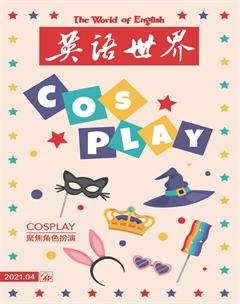A Hunger for Words1对文字感到饥渴
彼得·斯韦蒂纳 杨颜彦
Where I live, bushes turn green in late April or early May, and are soon populated by butterfly cocoons. These look like wads of cotton or candy floss, and the pupae devour leaf after leaf until the bushes are stripped bare2. When developed, the butterflies fly away, however, the bushes have not been destroyed. As summer comes around, they turn green again, each and every time.
This is a picture of a writer, a picture of a poet. Theyre eaten away, bled dry by their stories and poetry, which, when theyre finished, fly away, retire into books and find their audience. This happens again and again.
And what happens with these poems and stories?
I know a boy who had to have eye surgery. For two weeks after the operation, he was only allowed to lie on his right side, and after that was not permitted to read anything for a month. As he finally got hold of a book after a month and a half, he felt as if he was scooping up words from a bowl with a spoon. As if he was eating them. Actually eating them.
And I know a girl who grew up to be a teacher. She has told me: Children who hadnt been read to by their parents are impoverished3.
Words in poetry and in stories are food. Not food for the body, not food that can fill up your stomach. But food for the spirit and food for the soul.
When one is hungry or thirsty, their stomach contracts and their mouth turns dry. They look for anything to eat, a piece of bread, a bowl of rice or corn, a fish or a banana. The hungrier they grow, the narrower becomes their focus, they become blind to everything but the food that could sate them.
The hunger for words manifests itself differently: as gloominess, obliviousness, arrogance. People suffering from this sort of hunger dont realize their souls are shivering cold, that theyre walking past themselves without noticing. A part of their world is running away from them without them being aware of it.
This type of hunger is sated by poetry and stories.
But is there hope for those who have never indulged in words to ever satisfy this hunger?
There is. The boy reads, almost every day. The girl who had grown up to be a teacher reads stories to her pupils. Every Friday. Every week. If she ever forgets, the children are sure to remind her.
And what about the writer and the poet? As summer comes, theyll turn green again4. And again, theyll be eaten away by their stories and their poems that will then fly away in all directions. Again and again. ■
在我住的地方,每到四月末或五月初,灌木吐绿,很快便会挂满蝴蝶的茧,看起来像一团团棉花或棉花糖。幼虫吃掉一片又一片叶子,直至灌木变得光秃,破茧成蝶后便纷飞而去。但灌木的生机并未断绝,待夏天来临又会重新吐绿,年年如此。
这便是作家和诗人的写照。他们呕心沥血,为创作故事和诗歌殚精竭虑;作品一经完成就飞走了,落入书页,去到读者手中。如此这般,循环往复。
那么这些诗歌和故事会如何呢?
我认识一个男孩,他做了眼科手术,术后两周只能朝右侧卧,再之后一个月不许他看书。一个半月后,當他终于捧起一本书,感觉自己就像是从碗里舀出一勺又一勺的文字,仿佛在吞食这些文字,真的将它们吃进肚子里。
我还认识一个女孩,长大后当了老师。她曾告诉我,父母不曾读书给他们听的孩子,其精神是贫瘠的。
诗歌与故事中的文字就是食物,不是身体所需的食物,不是填饱胃袋的食物,而是精神的食粮,是心灵的食粮。
人在饥渴时,胃会收缩,嘴巴会发涩。他们会寻找吃的,一片面包,一碗米饭或玉米粒,一条鱼,或者一根香蕉。越是饥饿,关注点就越是狭小,除了能饱腹的食物,对其他一切视若无睹。
与腹中饥饿不同,对文字感到饥渴时,人会变得精神沮丧、感觉麻木、狂妄自大。承受这种饥饿的人意识不到他们的灵魂正打着寒战,意识不到不经意间他们的肉身与灵魂正擦身而过。在他们的世界里,有些东西在远去,可他们却毫无察觉。
这种饥饿需要诗歌和故事来填补。
不过,那些从未徜徉于文字的人,他们还有希望消除这种饥饿吗?
当然有。做了眼科手术的男孩现在几乎每天阅读;长大当了老师的女孩每周五都会给她的学生讲故事,一周不落。就算她忘了,孩子们也一定会提醒她。
那作家和诗人呢?当夏天来临,他们又会如灌木一般重新吐绿。故事和诗歌会耗尽他们的心力,而后离开,朝四面八方飞去。循环往复,周而复始。□
(译者单位:上海外国语大学高级翻译学院)

